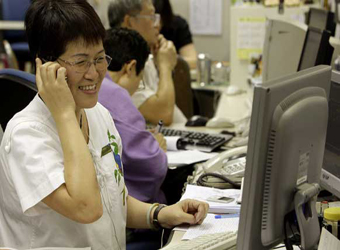Asia markets gained on Tuesday morning as investors shrugged off the disappointment from the current U.S. administration’s ability to push through legislation to repeal and replace the Obama-era health-care law.
Japan’s Nikkei 225 rose 1.07 percent, recovering most of its losses of 276 points, or 1.44 percent, seen yesterday.
Fujitsu and Lenovo Group announced the postponement of their target date for a final deal on their personal computer business tie-up to sometime in the first-half of 2017, the Nikkei business daily reported.
Shares of Fujitsu were up 2.66 percent and the Hong Kong-listed Lenovo was up 1.23 percent.
Down Under, the ASX 200 added 1.15 percent, underpinned by strength in its energy sub-index, which was up 1.45 percent, and the materials sub-index, which was up 0.95 percent.
Australia’s Myer dropped 3.97 percent, after rallying about 18 percent yesterday, amid speculation that a takeover bid was on the cards, although no one has made an announcement.
In South Korea, the Kospi was up 0.21 percent, after the country revised its fourth-quarter gross domestic product up 2.4 percent year-on-year, from the 2.3 percent expected gain.
For the full year, the economy grew by 2.8 percent, expanding at a similar rate to 2015, Reuters reported.
The Shanghai composite was down 0.26 percent and Shenzhen composite was flat. Hong Kong’s Hang Seng index was up 0.49 percent.
China Southern Airlines shares were up 1.78 percent, bucking the mostly lower trend for other Chinese airlines. The carrier said it was raising 1.55 billion Hong Kong dollars ($255 million) from selling H-shares to American Airlines Group, and will use the net proceeds for general working capital.
In Hong Kong , Guotai Junan Securities will kick off its IPO subscription. It plans to raise HK$16.04 billion ($2.1 billion), and has priced the IPO already, at HK$15.84 per share.
Related securities such as Shanghai-listed Guotai Junan Securities fell 0.64 percent and Hong Kong-listed Guotai Junan International was down 1.12 percent.
“This is a Teflon market where literally nothing sticks,” Chris Weston, chief market strategist at IG, in a Tuesday note, said of the market’s concern about Trump’s first legislative reform failure.
U.S. major indexes closed mostly lower on Monday as investors reassessed whether Trump’s administration cam deliver on reforms.
The Dow Jones industrial average fell 0.22 percent, to close at 20,550.98, and posted its eight day of losses.
The S&P 500 dropped 0.1 percent, to end at 2,341.59, and the Nasdaq composite gained 0.2 percent, to close at 5,840.37.
The dollar traded at 99.239 against a basket of currencies at 11:10 am HK/SIN, firmer compared to levels as low as 98.858 seen on Monday.
Against the greenback, the yen was stronger at 110.61 and the Australian dollar was at $0.7628.
Oil prices continued to slide on Monday as investors remained uncertain about whether the OPEC and non-OPEC supply curb deal would continue beyond June.
Asia will lead the global demand growth in oil this year as production on the continent declines, an official with the Paris-based International Energy Agency (IEA) said Tuesday. During Asian hours, Brent crude was up 0.1 percent at $50.80 a barrel, and U.S. crude was up 0.19 percent at $47.83.
Source: CNBC
